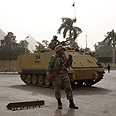

Senior security officials told Ynet Sunday that the fact that Israel did not anticipate the uprising in Egypt does not constitute an intelligence failure. They urged the government in Jerusalem to follow the developments but refrain from intervening.
Leaked documents recently published by WikiLeaks revealed that former Mossad chief Meir Dagan estimated that President Hosni Mubarak's regime was stable, and just last week incoming IDF Intelligence chief Maj. Gen. Aviv Kochavi said there regime in Cairo was in no serious danger of collapsing.
Former IDF Chief of Staff Amnon Lipkin-Shahak said, "While we knew there were major problems in Egypt, is it still hard to demand from the intelligence agencies to predict such extreme developments. The intelligence services have their own priorities. We expect them to warn of an upcoming war, but the demands must be reasonable."
As for the uprising itself, Lipkin-Shahak said that despite the fact that there have been no reports of clashes between civilians and the Egyptian army, "the army is carrying out the orders of the political echelon and is preventing the Muslim Brotherhood from leading the (protests)."
The former IDF chief stressed that Vice President Omar Suleiman and the new Egyptian Prime minister Ahmed Shafiq both have a military background. "The senior military commanders are an integral part of Mubarak's regime, and this is why (the army) will apparently continue to protect the government," he said.
Lipkin-Shahak says the fact that the Egyptian army is holding its ground is positive for Israel. "The army is western in its orientation and is dependent on American money and equipment. It needs the West's support," he said.
'Treaty as important to Egypt as it is to Israel'
According to him, the possible collapse of the Mubarak regime would not necessarily be detrimental to Israel. "Perhaps is what comfortable for us politically, but we must keep in mind that the peace treaty is just as important to Egypt as it is to Israel.
"I don’t foresee a completely new situation along the southern border, but Israel must follow the developments in any case," Lipkin-Shahak said.
Yaakov Amidror, former director of the IDF's Research and Assessment Division said, "There is no way they (Israeli intelligence services) could have predicted this uprising, which Mubarak himself did not predict.
"Intelligence work is not magic, and some things will never be predicted – such as situations where social problems lead to a revolution," he said.
Unlike Lipkin-Shahak's optimistic outlook, Amidror warned of the leaders of the protest against Mubarak. "They don’t have one leadership or one organization. The most organized body is the Muslim Brotherhood, and their clear advantage as leaders of the revolution constitutes a real danger. The Islamic Revolution in Iran also started as a popular revolt of secular and student groups," he said.
In any case, Amidror believes that Israel should draw conclusions from the events taking place in Egypt. "We should learn that we are living at the foot of a volcano. Even if it's quiet, it doesn’t mean there will not be an eruption in the future.
"We need to understand that Israel's security is sometimes more important than political agreements. We must not fool ourselves, and better face reality as it is – not in a naïve manner. For the time being, Israel needs to stand aside and follow the different scenarios. There is no point in conducting operative measures on the ground," Amidror concluded.
'Too soon to write Mubarak off'
Former IDF Southern Command chief Major-General (res.) Doron Almog claimed that it was too soon to write off Mubarak's regime. "The level of protest surprised me and the Israeli security establishment, but at this point there is no alternative political power that can lead the masses and take the helm," he said.
Almog also sees the Egyptian army and its stability is a calming element – at least for Israelis. "It possesses the power to run the country. Mubarak might step down and the army might run the country in the upcoming months. As far as Israel is concerned, this could be good news, because the Egyptian army's leadership has shown restraint in its use of force," he added.
Almog estimated that despite the prominent presence of members of the Muslim Brotherhood on the streets of Egypt, it is still the group will head the country. "It's always good to prepare for these horror scenarios, but for the time being, it seems things are headed in a different direction," Almog concluded.
- Follow Ynetnews on Facebook















